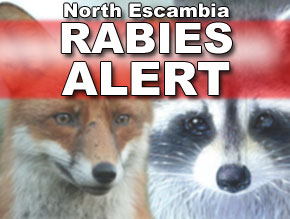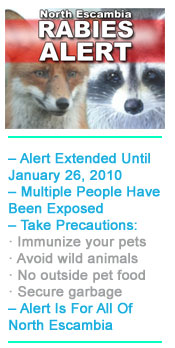Rabies Alert Extended Again; Lab Results Positive For Rabid Cat
December 3, 2009
A rabies alert for North Escambia has been extended again, this time until late January of next year.
 The rabies alert was extended Wednesday by Dr. John Lanza, director of the Escambia County (FL) Health Department, after another animal in the area tested positive for rabies. The health department received laboratory confirmation of rabies in a cat that exposed at least six people to rabies in late October.
The rabies alert was extended Wednesday by Dr. John Lanza, director of the Escambia County (FL) Health Department, after another animal in the area tested positive for rabies. The health department received laboratory confirmation of rabies in a cat that exposed at least six people to rabies in late October.
While the health department will not confirm the location of the cat incident, NorthEscambia.com independently confirmed that the incident occurred October 23 near McDavid. According to a source familiar with the incident, a woman was bitten outside her home. She retreated inside her house and called for help from a neighbor because she feared going back outdoors where the cat remained. We were told that four or five people total were bitten or scratched by the animal. Some of those attacked by the cat were attempting to trap the cat. Health department officials would not confirm that an animal control worker called to the scene was also “exposed” to rabies.
“At least six people were exposed to this feral cat,” according to Molly Payne-Hardin, spokesperson for the Escambia County Health Department, “some during the course of trying to trap it.”
The first 60-day Rabies Alert was issued August 28, 2009 to last a period of 60 days after one person was bit by a rabid fox and two raccoons that bit dogs tested positive for rabies. One dog was bitten on Crabtree Church Road in Molino, the second on Handy Road in Cottage Hill. The rabies alert was extended until November 29 when three additional rabid animals — a skunk and two raccoons — were found in the area. The latest extension, prompted by the cat incident, continues the rabies alert until January 26, 2010.
In all of the recent incidents, Payne-Hardin said there is one common denominator.
“All of the rabid animals were attracted to pet food that was left outside,” she said. “It is important to not leave pet food outdoors after your pet has ate, even it you bring it in just for the night.”
 The rabies alert is for all of North Escambia, from Muscogee Road north to the Alabama state line, including all areas between the Escambia and Perdido rivers north of Musocogee Road.
The rabies alert is for all of North Escambia, from Muscogee Road north to the Alabama state line, including all areas between the Escambia and Perdido rivers north of Musocogee Road.
“Rabies will kill humans and their pets if it is not treated,” said Dr. John Lanza, director of the Escambia County Health Department. “I urge residents to keep their pets vaccinated, to stay away from wild animals, and to take basic precautions to keep wild animals from coming to your home.”
Escambia residents should be aware that rabies is present in the wild animal population and domestic animals are at risk if not vaccinated. The public is asked to maintain a heightened awareness that rabies is active in North Escambia, according to the health department. Alerts are designed to increase awareness to the public, but they should not give a false sense of security to areas that have not been named as under an alert.
An animal with rabies could infect other wild animals or domestic animals that have not been vaccinated against rabies. All domestic animals should be vaccinated against rabies and humans should avoid all wildlife contact, especially with raccoons, bats, and foxes.
Rabies is a disease of the nervous system and is usually fatal to warm-blooded animals and to humans. The only treatment for human exposure to rabies is rabies-specific immune globulin and rabies immunization. Appropriate treatment started soon after the exposure will protect an exposed person from the disease.
The following advice is issued:
- All pets should have current rabies immunizations.
- Avoid contact with all wildlife, especially raccoons, bats, and foxes.
- All persons with any unusual exposure incident, or bites, with a wild animal should be evaluated by a physician to determine their need for treatment.
- For general questions pertaining to rabies in animals, contact the Escambia County Health Department’s Environmental Health Division at (850) 595-6700.
- Secure outside garbage in covered containers to avoid attracting wild animals.
- Do not leave pet food outside as this practice also attracts other animals.
- For questions regarding the health of an animal, contact a veterinarian.
- Veterinarian staff and animal control staff should be alert for animals encountered with signs suspicious for rabies and contact the Escambia County Health Department’s Environmental Health Division at (850) 595-6700.
For further information on rabies, go to the Florida Department of Health website: http://www.doh.state.fl.us/disease_ctrl/epi/diseases.htm or contact the Escambia County Health Department, Environmental Health office at (850) 595-6700.
Comments
6 Responses to “Rabies Alert Extended Again; Lab Results Positive For Rabid Cat”



I appreciate the notification.
Can a vacinated pet who comes in contact with a rabid animal pass anything on to its owners?
Redbud said, “…eliminate feral cat colonies and require spaying/neutering of all pets.” What a crock of crap. That is the propaganda being dispensed by the puppy mills who want control the pet sales business. They already want $500 or more for a puppy. If they were the only ones allowed to have unaltered animals, they would quickly drive the price up over $1,000 apiece. Either Redbud is a sucker or he is one of the producers who want total control.
This is a major problem with feral cat colonies. Wildlife is attracted to the food source and the cats are exposed to all sorts of parasites and diseases. Most cats cannot be re-trapped so any vaccinations they received expire. We must stop feeding outdoor cats, eliminate feral cat colonies and require spaying/neutering of all pets.
Molino Mom,
What EXACTLY would you have the Health Department do besides put out an alert?
Should they hunt down and kill every wild and/or domesticated animal that could possibly have rabies?
Maybe they should put signs up in the woods asking all wild animals to come in for free rabies tests and vaccinations?
You must be one of those people who think that it is the government’s job to protect you from everything!!!!
One rabid cat. Bit one rabid rabbit. One rabid rabbit bit 100 relative rabbits. 100 rabid rabbit bit 100 rabbits each. 100 rabid rabbits x 100 rabid rabbits = 10,000 rabid rabbits. This was all last Thursday. What happens next? We are all in trouble.
Has the health department actually done anything about this, besides putting out a “rabies alert”? Or is rabies continuing to spread unchecked in our communities?